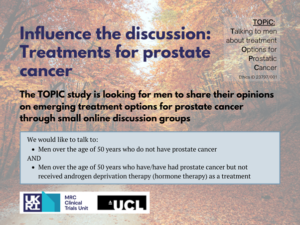If you are a researcher and would like to share news about your prostate cancer study, please email a short outline of your work and proof of ethics approval to [email protected].
- Posted: 15 December 2022
- Tagged: Research Updates
TOPiC: Talking with men about treatment Options for Prostatic Cancer
This week, our blog features a guest post by Dr Hannah Rush, an oncology doctor completing research about prostate cancer.

What is the research and why is it important?
This focus group study is exploring how men feel about emerging types of androgen deprivation therapy (ADT). We will present men with information about injection (the current most common form of ADT), patch and tablet versions of ADT, including key similarities and differences. We will ask men if they were faced with a hypothetical decision between treatments, which they would choose and why.
Trials have recently demonstrated both patch and tablet versions of ADT lower testosterone equally as well as injection forms of ADT. However, implementation of new treatments following positive trial results can take time. By exploring men’s views on these types of ADT, we hope to establish whether there is a demand for access to these treatments. Depending on the results of the study this may lead to further work, advocating access to new ADT options.
We have previously asked a similar question in discussions with men who have prostate cancer and experience of ADT. We would now like to speak to men who do not have prostate cancer or who have prostate cancer but have not had any ADT.

Who is conducting this research?
This study is being organised by Dr Hannah Rush who is an oncology doctor completing research about prostate cancer. This study will contribute to her research degree at UCL. Hannah also works as part of the PATCH and STAMPEDE trial teams which are evaluating treatments to improve the lives of men with prostate cancer. The results of this study may influence future plans in these clinical trials.
How can I help this project?
We are looking for volunteers who would be able to join a focus group discussion in January or February 2023. Discussions will be focused on the relative pros and cons of each treatment and whether participants prefer any of the treatments. Discussions will be held online in small groups and will take approximately 90 minutes.
If I participate, what will happen? Will I be contacted afterwards?
If you are interested in participating, we will first ask that you read an online information sheet with details about how the study will be conducted. This will explain how to sign up for the study and take you to a consent form if you wish to proceed.
Please find the link to the information sheet webpage here: https://www.mrcctu.ucl.ac.uk/studies/all-studies/s/stampede/topic
Once the trial has sufficient participants to plan the focus groups you will be contacted by the research team. They will confirm the time and date and provide further information, including how to join the online discussion groups.
Will I hear back from the researcher once the study is finished?
After the focus groups have been conducted, we will analyse the discussion and write a report. This will summarise the main outcomes and themes arising from the discussion, and we hope this will be published. This can take several months. All reports or other outcomes from the project will be fully anonymised. Any results will be posted onto the TOPiC webpage that all participants will continue to have access to.
Who can I contact for more information?
Please look at our webpage https://www.mrcctu.ucl.ac.uk/studies/all-studies/s/stampede/topic and contact the study team at [email protected] for more information.
If you would like to participate or learn more about the study, please follow this link
Hannah does not receive funding from PCR. We decided to feature this research on the PCR website because we felt it was an important topic, with the potential to improve quality of life for men with prostate cancer. We also confirmed ethics approval before deciding to help promote Hannah's research.